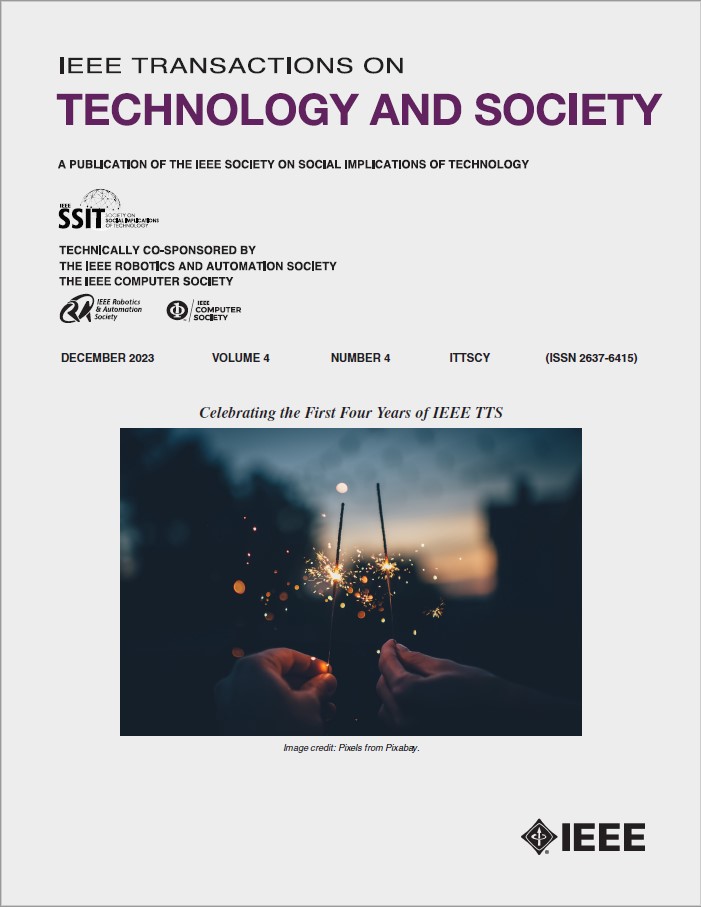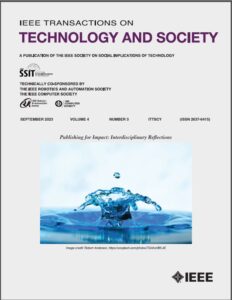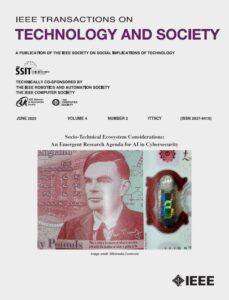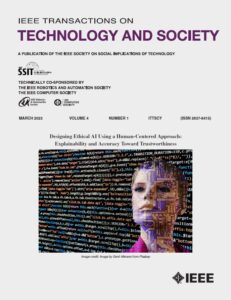
Volume 4, Issue 4, 2023
Editorial
Celebrating the First Four Years of IEEE TTS by Katina Michael, Roba Abbas and George Roussos
Papers
Ethical Issues in Near-Future Socially Supportive Smart Assistants for Older Adults by Alex John London, Yosef S. Razin, Jason Borenstein, Motahhare Eslami, Russell Perkins and Paul Robinette
Abstract
The Ethics of Mandatory Exoskeleton Use in Commercial and Industrial Settings by Timothy R. Pote, Nicole V. Asbeck and Alan T. Asbeck
Abstract
Using Community Values and Governance Preferences to Facilitate Transitions Toward Sustainable Energies by Claas Digmayer and Gregory P. Pogue
Abstract
Social Media as an Instant Source of Feedback on Water Quality by K Ahmad, M. A. Ayub, K. Ahmad, J. Khan, N. Ahmad, and A. Al-Fuqaha
Abstract
LifeTEC: A Compact and Economic System for In-the-Field Management of Firefighting Services Through TETRA by Luis A. López-Valcárcel, Manuel García Sánchez and Enrique Costa-Montenegro
Abstract
The Value of Trust in Encryption: Impact and Implications on Technology Law and Policy by Michael Anthony C. Dizon
Abstract
On the Role of Technology in Human–Dog Relationships: A Future of Nightmares or Dreams? by Dirk van der Linden, Brittany I. Davidson, Orit Hirsch-Matsioulas and Anna Zamansky
Abstract
Volume 4, Issue 3, 2023 – Special Issue on Publishing for Impact: Interdisciplinary Reflections
Editorials
Call for Senior Editors and Associate Editors of the IEEE Transactions on Technology and Society by Katina Michael and Roba Abbas
IEEE Transactions on Technology and Society Call for Special Issue Proposals by Katina Michael and Roba Abbas
Guest Editorial
Publishing for Impact: Interdisciplinary Reflections by Roba Abbas, Katina Michael, Kieran Conboy, Marijn Janssen, Yogesh K. Dwivedi, Cleopatra Veloutsou, Thanos Papadopoulos and Rameshwar Dubey
Special Issue Papers
Publishing as a Science and as an Art—An Integrative Approach to Knowledge and Creativity in Research by Marijn Janssen
Abstract
Demystifying the Journal Review Process: An Editor’s Observations by Sara Dolnicar
Abstract
A Stepwise Strategy for Upgrading Publication Outcomes to A* in Management by Jon Billsberry
Abstract
Training the Next Generation of Doctoral Researchers in Data Science: The Impact on Publications and Beyond by Savvas Papagiannidis; Maureen Meadows and Panos Panagiotopoulos
Abstract
Practicing Effective Stakeholder Engagement for Impactful Research by Ilias O. Pappas, Polyxeni Vassilakopoulou, Leona Chandra Kruse and Sandeep Purao
Abstract
Regular Issue Papers
Unleashing Sociotechnical Imaginaries to Advance Just and Sustainable Energy Transitions: The Case of Solar Energy
in Puerto Rico by Angel Echevarria, Yiamar Rivera-Matos, Nafeesa Irshad, Christopher Gregory, Marcel J. Castro-Sitiriche, Richard R. King and Clark A. Miller
Abstract
Exploring the Application of Design Thinking Methodology in Cellular Communications Network Planning and
Deployment by Iñigo Cuiñas, Anna Laska-Leśniewicz, Katarzyna Znajdek, Dorota KamińskaIñigo Cuiñas, Anna Laska-Leśniewicz, Katarzyna Znajdek and Dorota Kamińska
Abstract
Volume 4, Issue 2, 2023 – Special Issues on Socio-Technical Ecosystem Considerations: An Emergent Research Agenda for AI in Cybersecurity
Editorial
AI in Cybersecurity: The Paradox by Katina Michael, Roba Abbas, George Roussos
Roba Abbas Appointed New Co-Editor-in-Chief of IEEE Transactions on Technology and Society by Terri Bookman
Guest Editorial
Socio-Technical Ecosystem Considerations: An Emergent Research Agenda for AI in Cybersecurity by Mariarosaria Taddeo, Paul Jones, Roba Abbas, Kathleen Vogel and Katina Michael
Special Issue Papers
Regulating Brain–Computer Interfaces: Ensuring Soft Law Does Not Go Flat by Lucille Nalbach Tournas and Walter G. Johnson
Abstract
Analyzing Human Observer Ability in Morphing Attack Detection—Where Do We Stand? by Sankini Rancha Godage, Frøy Løvåsdal, Sushma Venkatesh, Kiran Raja, Raghavendra Ramachandra and Christoph Busch
Abstract
The Semantic Attack Surface: A Systems-Dynamic Model of Narrative in Cyberspace by Catherine B. Smith
Abstract
EXTRUST: Reducing Exploit Stockpiles With a Privacy-Preserving Depletion System for Inter-State Relationships by Thomas Reinhold, Philipp Kuehn, Daniel Günther, Thomas Schneider and Christian Reuter
Abstract
AI Ethics Principles in Practice: Perspectives of Designers and Developers by Conrad Sanderson, David Douglas, Qinghua Lu, Emma Schleiger, Jon Whittle, Justine Lacey, Glenn Newnham, Stefan Hajkowicz, Cathy Robinson and David Hansen
Abstract
Discerning Between the “Easy” and “Hard” Problems of AI Governance by Matti Minkkinen and Matti Mäntymäki
Abstract
Volume 4, Issue 1, 2023 – Special Issue on Designing Ethical AI Using A Human-Centered Approach: Explainability and Accuracy Toward Trustworthiness
Editorial
Can God Be an AI With Robo-Priests? by M. G. Michael, Katina Michael and Terri Bookman
Guest Editorial
Designing AI Using a Human-Centered Approach: Explainability and Accuracy Toward Trustworthiness by Jordan Richard Schoenherr, Roba Abbas, Katina Michael, Pablo Rivas, and Theresa Dirndorfer Anderson
Special Issue Papers
The Re-Conception of AI: Beyond Artificial, and Beyond Intelligence by Roger Clarke
Abstract
Explaining Technology We Do Not Understand by Greg Adamson
Abstract
It Is Not “Accuracy vs. Explainability”—We Need Both for Trustworthy AI Systems by Dragutin Petkovic
Abstract
In-Group Bias in Deep Learning-Based Face Recognition Models Due to Ethnicity and Age by Shruti Nagpal, Maneet Singh, Richa Singh, Mayank Vatsa and Nalini K. Ratha
Abstract
Challenges of Deep Learning in Medical Image Analysis—Improving Explainability and Trust by Tribikram Dhar, Nilanjan Dey, Surekha Borra and R. Simon Sherratt
Abstract
Automatic and Efficient Framework for Identifying Multiple Neurological Disorders From EEG Signals by Md. Nurul Ahad Tawhid, Siuly Siuly, Kate Wang and Hua Wang
Abstract
Smart Education in Smart Cities: Layered Implications for Networked and Ubiquitous Learning by Jason C. K. Tham and Gustav Verhulsdonckv
Abstract
Abstracted Power and Responsibility in Computer Science Ethics Education by Tina L. Peterson, Rodrigo Ferreira and Moshe Y. Vardi
Abstract









 JOIN SSIT
JOIN SSIT